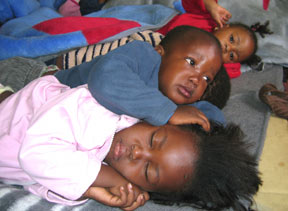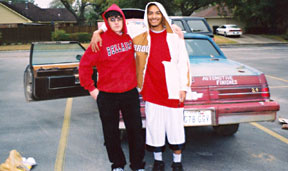Cybercolumn by Jeanie Miley: ‘Jesus sells!’
Posted: 6/03/06
CYBER COLUMN:
'Jesus sells!'
By Jeanie Miley
The words coming from my television stopped me in my tracks.
“In the next segment, we will hear a report on how Jesus is big business,” the news reporter announced while enticing visuals played across the screen right before the commercial for the latest drug for pain relief.
Curiosity hooked me, and so I waited around for the segment on national television, but a kind of anguish has followed me around ever since. Every time I see a “religious” bumper sticker or T-shirt, I remember the holy reverence with which I was taught to speak the name of the Holy One. I remember grave cautions against taking God’s name in vain.
| Jeanie Miley |
After watching the segment about how Jesus sells, I kept on turning the concept of “Jesus sells” over and over in my mind. Going about my day’s activities and taking care of my business in this consumer-oriented society, a song from my childhood that I haven’t heard in a long time popped up from the archives of my memory. It’s a long, long way from “Jesus saves” to “Jesus sells.”
I talk to myself about how I’ve become an old fogey. I keep trying to push myself to open my mind a bit, and I keep hearing people tell me that Jesus, himself, would adapt to the culture in order to get the word out about himself. “Isn’t what matters that people hear about Jesus?” people ask me. “Don’t we have to use methods to spread the gospel?”
Somehow, though, I just can’t make it sound right to sing, “We have heard the joyful sound. Jesus sells, Jesus sells,” and somehow, I just can’t make it right that Jesus is big business.
I keep wrestling with this whole idea of Jesus being a hot item. I wonder if Jesus can save if we are more concerned about selling him than knowing him. Is selling Jesus serving him—or serving another master? It’s hard to tell sometimes, isn’t it?
I keep on wondering if Jesus can save if we see him primarily as a product. Don’t people then become objects to us, potential buyers to us, and isn’t it awfully easy to become more concerned with counting up our profit when Jesus is a product? It’s hard not to get confused about what comes first, isn’t it?
Are we so shaped and formed by our consumer culture that we have lost the ability to discern the difference between what is hype and what is Real? Have we become so calloused by our consumerism that we have lost the ability to know what it means to enter into a relationship with Christ, thinking that selling Jesus is ministry?
I do know for sure, however, that Jesus saves. I know that it is possible to have a personal, dynamic, intimate love relationship with the living Christ, and I know that living Christ who dwells within my heart has the capacity to heal and transform, liberate and empower. I know that Jesus is about the business of making people whole and healthy and that salvation is the most important thing that can happen to a human being.
The truth is that Jesus can save, no matter what, but when our minds are focused on the bottom line, the next client or purchaser, the competition and the best way to close a deal, it has to be harder for him than it ought to be.
“Does it really matter,” someone asked me, “as long as people are hearing the gospel?”
That’s a point, I guess, but is it the real point?
Jeanie Miley is an author and columnist and a retreat and workshop leader. She is married to Martus Miley, pastor of River Oaks Baptist Church in Houston, and they have three adult daughters. Got feedback? Write her at Writer2530@aol.com.









